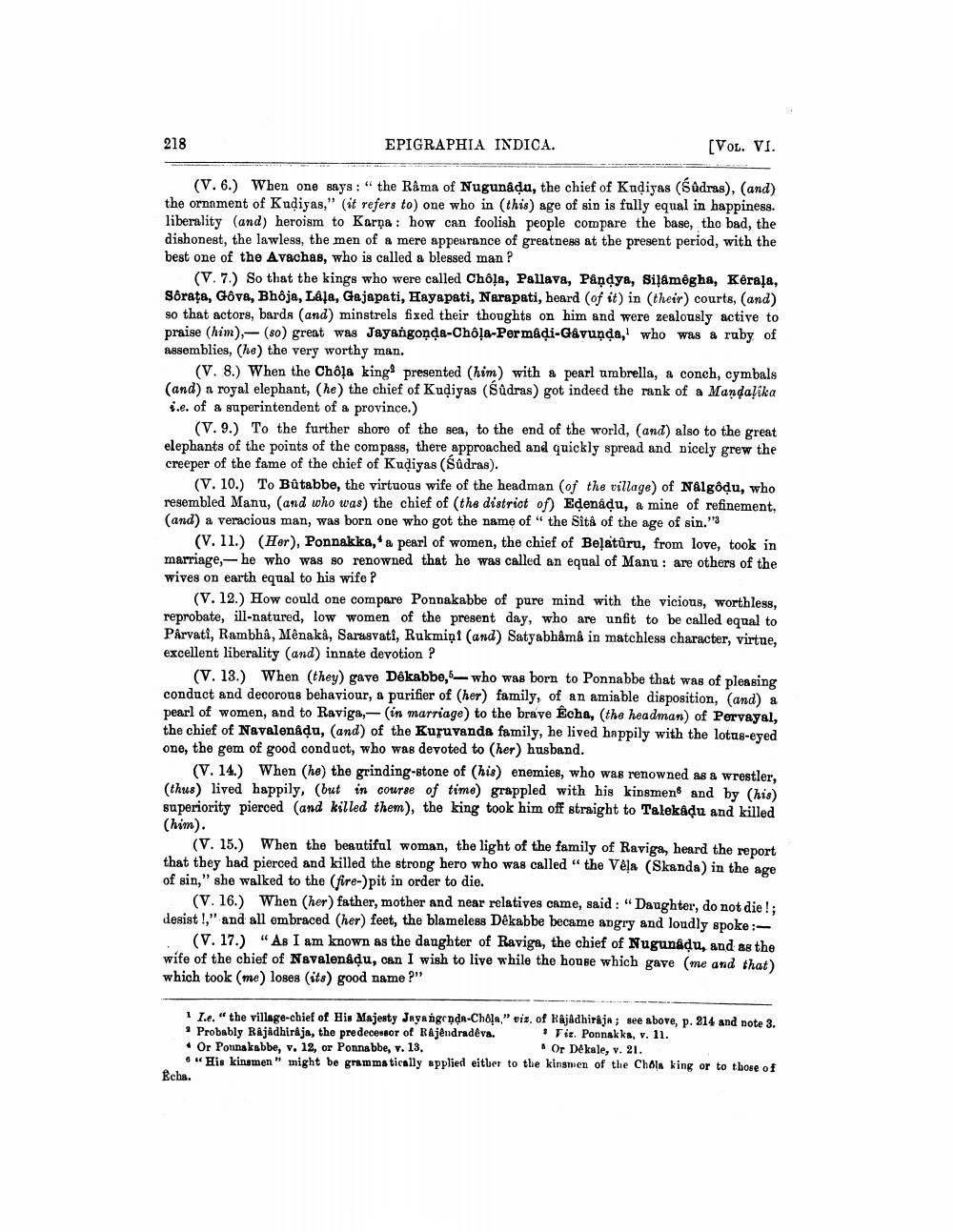________________
218
EPIGRAPHIA INDICA.
(VOL. VI.
(V. 6.) When one says: "the Râma of Nugunada, the chief of Kadiyas (Sudras), (and) the ornament of Kudiyas," (it refers to one who in (this) age of sin is fully equal in happiness. liberality (and) heroism to Karna : how can foolish people compare the base, tho bad, the dishonest, the lawless, the men of a mere appearance of greatness at the present period, with the best one of the Avachas, who is called a blessed man?
(V. 7.) So that the kings who were called Chôļa, Pallava, Pandya, Siļamégha, Kerala, Sôrata, Gáva, Bhôja, Lala, Gajapati, Hayapati, Narapati, beard (of it) in (their) courts, (and) so that actors, bards (and) minstrels fixed their thoughts on him and were zealously active to praise him),- (s0great was Jayangonda-Chôla-Permadi-Gâvuņda, who was a ruby of assemblies, (he) the very worthy man.
(V. 8.) When the Chôļa king presented (him) with a pearl umbrella, a conch, cymbals (and) a royal elephant, (he) the chief of Kudiyas (Südras) got indeed the rank of a Mandaļika 3.e. of a superintendent of a province.)
(V. 9.) To the further shore of the sea, to the end of the world, (and) also to the great elephants of the points of the compass, there approached and quickly spread and nicely grew the creeper of the fame of the chief of Kudiyas (Sûdras).
(V. 10.) To Batabbe, the virtuous wife of the headman (of the village) of Nalgodu, who resembled Manu, (and who was) the chief of the district of) Edenadu, a mine of refinement, (and) a veracious man, was born one who got the name of the Sitå of the age of sin."
(V. 11.) (Her), Ponnakka," a pearl of women, the chief of Belatûru, from love, took in marriage, he who was so renowned that he was called an equal of Manu: are others of the wives on earth equal to his wife ?
(V. 12.) How could one compare Ponnakabbe of pure mind with the vicious, worthless, reprobate, ill-natured, low women of the present day, who are unfit to be called equal to Parvati, Rambha, Menaka, Sarasvati, Rukmiņi (and) Satyabh&m& in matchless character, virtue, excellent liberality (and) innate devotion ?
(V. 13.) When they gave Dekabbe, who was born to Ponnabbe that was of pleasing conduct and decorous behaviour, a purifier of (her) family, of an amiable disposition, (and) a pearl of women, and to Raviga,- (in marriage) to the brave Écha, (the headman) of Pervayal, the chief of Navalenádu, (and) of the Kuruvanda family, he lived happily with the lotus-eyed one, the gem of good conduct, who was devoted to (her) husband.
(V. 14.) When (he) the grinding-stone of (his) enemies, who was renowned as a wrestler, (thus) lived happily, (but in course of time) grappled with his kinsmen and by (his) superiority pierced (and killed them), the king took him off straight to Talekadu and killed (him).
(V. 15.) When the beautiful woman, the light of the family of Raviga, heard the report that they had pierced and killed the strong hero who was called “the Vēla (Skanda) in the age of sin," she walked to the (fire)pit in order to die.
(V. 16.) When (her) father, mother and near relatives came, said: "Daughter, do not die!; desist!," and all embraced (her) feet, the blameless Dekabbe became angry and loudly spoke :
(V. 17.) "As I am known as the daughter of Raviga, the chief of Nugunadu, and as the wife of the chief of Navalenádu, can I wish to live while the house which gave me and that) which took (me) loses (its good name?"
11.e. "the village-chief of His Majesty Jayangenda-Chöln." vis, of Rajadhiraja; see above, p. 214 and note 3. • Probably Rajadhiraja, the predecessor of Rajendradêve.
Tic. Ponnakka, v. 11. • Or Ponnaksbbe, v. 12, or Ponnabbe, v. 13.
Or Dekale, v. 21. . His kinamen" might be grammatically applied either to the kinsmen of the Chola king or to tbove of Echa.




